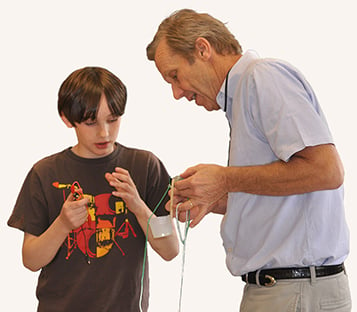These free introductory professional development sessions are a free opportunity to transform your instructional practice for the next generation science standards. Explore techniques you'll be able to add to your teacher toolkit for science like thinking moves, picture thinking, concept mapping, universal design, and phenomena-based consensus building and many more. If you're looking for more check our resources section or contact us for top NGSS hands-on science curriculum and professional development.

Contact us about designing your own.
Topic 1: Instructional Frames
Uncover how to master and communicate lesson routines with instructional frames. We’ll also focus on how you can use these instructional frames to maximize student learning while improving parent and student communication.
Topic #2: Picture-Thinking Routine
Examine how to structure reflection that uses students’ thinking to accelerate learning, increase student engagement, and foster student independence with KnowAtom’s Picture-Thinking Routine.
Topic 3: Thinking Moves
Focus on ways to make thinking moves a shared instructional practice and a common part of how students learn to deepen their own understanding as scientists and engineers.
Topic 4: Concept Maps
Discover the role students’ concept connections play in developing mastery of STEM content and skills. Examine next-generation ways to engage students in sense-making with the use of Concept Maps.
Topic 5: Scientific Discussion
Explore how to engage your science class in student-led scientific discourse with the help of three new tools that students can use to organize and communicate their thinking.
Topic 6: Peer Evaluation
Explore peer evaluation and SocraCircle, an online tool designed by KnowAtom to deepen students’ participation in Socratic dialogue or scientific discourse. We’ll focus on the ways technology like SocraCircle can be used with our other tools to facilitate deeper in-person and remote science discussions.
Topic 7: Read Aloud
Discover how to replace traditional pre-teaching with KnowAtom’s audio-visual non-fiction Read Aloud designed to present big ideas in context. We’ll focus on optimizing reading for every learner’s success in science and ways to engage caregivers with the Read Aloud to best support home learning.
Topic 8: Question Helpers
Learn how to move away from a model of instruction where the teacher is answer-expert to focus on the next generation model of helping students navigate context, annotate, and distill key ideas through better instructional questioning. We’ll also use the lens of remote teaching to discuss how parents and caregivers can effectively engage with students during and after their reading.
Topic 9: Formative Assessment
Teachers will learn how to formative assessment techniques to continuously uncover student thinking, skills, and conceptual understanding while clarifying their expectations for student learning. This in-the-moment insight can be used to improve the effectiveness of teaching and learning across disciplines.
Topic 10: Sentence Frames
Examine tools and scaffolds that will guide teachers in creating a culture of respectful scientific argumentation in their classrooms, driven by students’ interest in others' ideas.
Topic 11: Checkpoints
Discover how to use student Checkpoints as a formative assessment tool to uncover and improve students' understanding of their own plans and their thinking behind them.
Topic 12: Science Assessments
Explore how to get the most out of vocabulary and next generation concept checks as formative end-of-unit assessments to make the most out of student responses.
Contact us about designing your own.